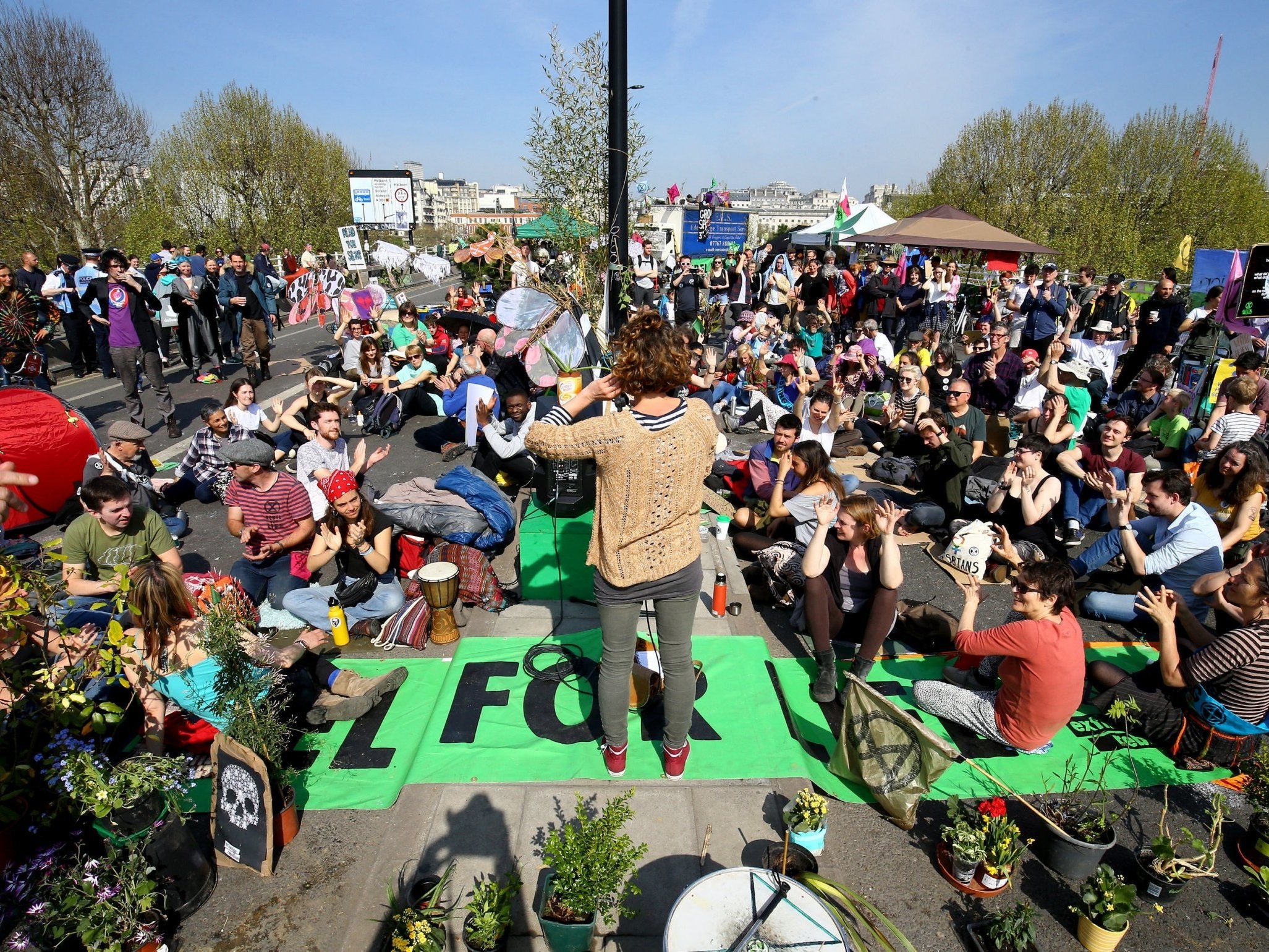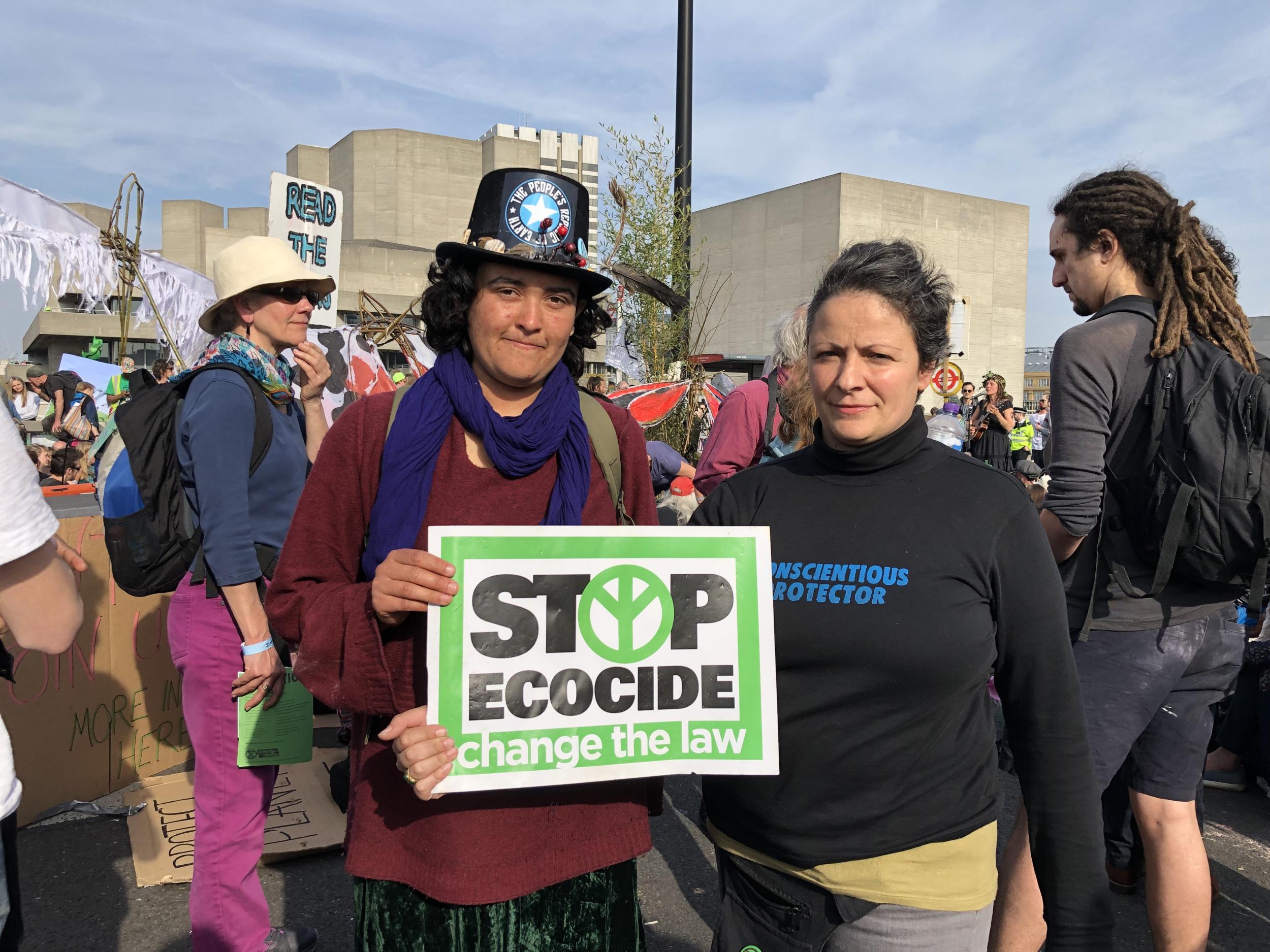How Extinction Rebellion protesters reclaimed the streets – and injected fresh energy into the climate movement
At London's busiest and most polluted junctions, cars have been swapped for pop-up kitchens and live music

Your support helps us to tell the story
From reproductive rights to climate change to Big Tech, The Independent is on the ground when the story is developing. Whether it's investigating the financials of Elon Musk's pro-Trump PAC or producing our latest documentary, 'The A Word', which shines a light on the American women fighting for reproductive rights, we know how important it is to parse out the facts from the messaging.
At such a critical moment in US history, we need reporters on the ground. Your donation allows us to keep sending journalists to speak to both sides of the story.
The Independent is trusted by Americans across the entire political spectrum. And unlike many other quality news outlets, we choose not to lock Americans out of our reporting and analysis with paywalls. We believe quality journalism should be available to everyone, paid for by those who can afford it.
Your support makes all the difference.Activists behind a week-long protest that has disrupted central London have vowed to step up their demonstration until the government agrees to demands for tougher action on climate change.
“If we see what we are doing is not getting attention, we will increase the noise that we make,” said Extinction Rebellion coordinator Yanai Postelnik from an encampment on Waterloo Bridge.
But for all the threats of chaos on the streets of the capital, some of London’s noisiest and most polluted junctions have been transformed. Streets are now dominated not by the steady hum of traffic and car horns but live music, the usual tailbacks replaced with pop-up kitchens and yoga mats.
“This is the garden bridge for considerably less than the Boris Johnson administration was suggesting,” 54-year-old Mr Postelnik, from Devon, said.
“These are rational, reasonable, caring people who have gone outside their comfort zone and are willing to go further if needed.”
The protest sites have sprouted tents, sound systems and even an ice cream van.
But there have also been hundreds of arrests – and by Friday the prospect of disruption had spread to Heathrow Airport.
The Metropolitan Police said it had “strong plans in place that would enable it to deploy a significant number of officers to Heathrow and take firm action” if needed.
The home secretary, Sajid Javid, said he wanted police to “take a firm stance and use the full force of the law”.
However, the vast majority of those arrested have been held only briefly before being released, with many choosing to rejoin the protest.
“I have been arrested twice this week,” said Mr Postelnik. “There is a risk of penalties, there is a risk of stigma, and yet the penalty for failing to act is much greater.”
Alex Dickinson, a 51-year-old environmental campaigner and lead steward at the Marble Arch demonstration, said most people did not intend to get arrested.
“We have a small number of people who for strategic reasons are prepared to get arrested, but we are not encouraging everyone to get arrested on principle,” he said.
“History shows if you march from A to B, that often doesn’t change anything. Like the march against the Iraq War, they went home and that told the government they don’t need to do anything.
“Even if the numbers drop off, what we are doing is raising the profile of the most important issue facing the planet.”
And while those involved hoped to use civil disobedience to raise awareness about the perilous state of the environment, among the make-shift communities that have grown – organically – across the city, there was a definite sense of order.
From the fully-stocked kitchen tent to the poster shop and whiteboard displaying the day’s shift pattern, the XR demonstration is remarkably well-run for a movement born only six months earlier and which, its members insist, functions without any one person officially taking charge.
On Waterloo Bridge, legal advice was being offered to ensure the protesters knew their rights when dealing with the police.
Bemused commuters walking across the bridge, which is completely closed to traffic, weave between crowds of demonstrators while tents were in place alongside potted plants lined up on the road.
Two miles away at Marble Arch, regular drop-in sessions were held for new recruits among the 100 or so tents pitched nearby.
And part of Oxford Street is still closed off to vehicles. A large pink boat – from which a DJ played music to throngs of supporters – obstructed the main junction with Regent Street, until police towed it away.
At the first aid tent on Waterloo Bridge, John Payne, a 70-year-old retired GP from the Forest of Dean, was putting his medical knowledge to good use.
“You get every kind of problem,” he explained. “Mental health issues, people who are shaken about the process of being arrested. Yesterday we spent all our time going through the crowd with sunscreen.
“We have got to act on climate change. Otherwise, in 20 or 30 years’ time, it will be people like me, the ‘fit elderly’, who will die.”
XR is demanding the government declare a climate and ecological emergency, reduce greenhouse gas emissions to net zero by 2025 and create a citizen’s assembly of members of the public to lead on solutions.
The UK has lowered net emissions by 42 per cent since 1990, and aims to cut emissions by 80 per cent by 2050. Government advisers are to suggest new targets next month.
But many activists The Independent spoke to this week said they held little hope for a significant shift in the government’s environmental policy in the coming weeks.

Katarine Hasapopoulos, a mother-of-three from Stroud who was held by police for six hours this week, said: “We are living in unprecedented times, and that calls for drastic measures. On Monday, I glued myself onto the Shell building, and I am prepared to keep doing that to bring about change and have our demands met.”
Narjuss Seffar, who has spent the last five nights sleeping on Waterloo Bridge, added: “We need a massive system change and it is not going to happen unless we obstruct and we rebel and we stay here until these conversations are had in parliament and finally meaningful change can happen.”
Join our commenting forum
Join thought-provoking conversations, follow other Independent readers and see their replies
Comments